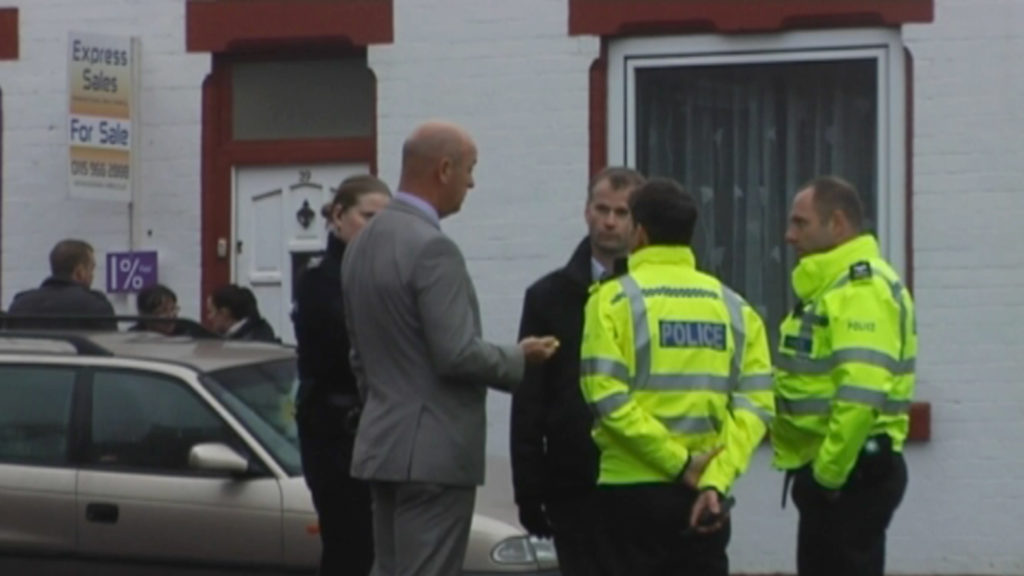It’s a little over four years since my family won a historic High Court victory over Bank of Scotland, which resulted in an illegal mortgage being removed from the Charges Register.
Now the Land Registry has cancelled the last remaining void mortgage over the Nelson Trust property portfolio, effectively conceding that the illegal charge was fraudulently registered. Here lies a summary of how and why it happened.
Summary of the Facts
Almost a decade ago, my father and I drove to Edinburgh for a meeting with Bank of Scotland director, Willie Sutherland, for the purposes of attempting to settle the bank’s claim that the Trustees of our family’s property trust owed BOS £2.5M.
The alleged debt arose from a rolling credit facility of £3M, £1.6M of which was used by the Trustees to acquire commercial properties. In return, they agreed to grant 1st priority charges to the bank, over every property in the portfolio, until such time that the capital and interest due was repaid.
It must be stressed that the value of the trust’s existing portfolio, as of the date the facility was made available to them in July 2003, was £2M; and all of the properties within the portfolio were owned outright.
The bank was only supposed to charge 6% interest on that £1.6M over the seven year term. Instead, they charged 16% interest on £3M and failed to factor in deposits and interest payments by the Trustees. This meant that no more than £350,000 was due to the bank at the onset of the dispute.
The Presentment of the Promissory Note
Initially, it was our genuine intention to settle the matter by presenting a Promissory Note [made payable to bearer] at the meeting. But when we did, Sutherland told us that nobody at the Lloyds Group had ever seen such an instrument before; and that the bank didn’t have the facility to accept it.
We knew the bank’s director was either lying to us or was ignorant of the HBOS Reorganization Act 2006, which prescribes that Bank of Scotland can [and always has been able to] accept notes such as the one we presented, whether to settle a debt or create a line of credit.
After explaining this to Sutherland, we also informed him that he would discharge the alleged debt, if he refused to accept the note, under section 43 of the Bills of Exchange Act 1882. He then did so in writing, on two separate occasions.
This somewhat inevitably led to an intense period of copious written communications, during which we asked the bank for the following items to validate the purported debt:
1. A legally enforceable mortgage contract, signed by both parties and containing all of the terms and conditions.
2. Legally enforceable mortgage deeds over each of the properties concerned.
3. Evidence that the alleged debt had not been legally discharged when the bank refused to accept the note.
Indubitably, the bank’s directors refused to provide us with any evidence that the debt they claimed was a valid one. However, they did threaten that a Statutory Demand for repayment in full would be issued, in the event the Trustees did not resume making the extortionate monthly interest rates, on £1.4M more than the credit they actually used.
A Preceding Equitable Obligation
Around the same time, the Trustees sold a flat in Jesmond Dene, Newcastle. When the proceeds were added to the money already resting in their account with Bank of Scotland, the Trustees had in excess of £500,000 in the bank, along with a monthly rental income of £11,000 per month.
In the region of £250,000 had been set aside by the Trustees for myself, in order to satisfy a long-standing equitable obligation, after I granted them the legal rights to my former London home in July 2001, in return for a deferred payment of its current market value.
This occurred a full two years before they opened an account with Bank of Scotland, which automatically meant that I had a legal right to register a 1st charge over all the Trust’s properties, until I received what was due to me.
However, before the Trustees could fulfill that obligation, the bank’s directors seized all the funds held in the accounts, appointed LPA Receivers to steal the rental income and issued the threatened Statutory Demand for immediate repayment of £2.5M.
Had the Trustees registered my overriding interest as 1st charges over the entire portfolio in July 2001, it would have automatically prevented Bank of Scotland from doing so.
In which case, the Trustees would never have been offered the rolling credit facility and the dispute would not have arisen, on the basis that granting 1st charges to secure the ‘borrowings’ was a mandatory condition of the arrangement.
Trustees of Nelson Trust v BOS & DTZ [2010]
Needless to say, we responded to the bank’s demand by issuing a High Court, Chancery Division claim, alleging that both the bank and its receivers were relying upon entirely fraudulent mortgage documents, in order to unjustly enrich themselves.
On the 22nd of October 2010, I presented the case for the Trustees, under limited powers of attorney. The claim was heard by senior Newcastle judge, HHJ Walton. Predictably enough, the bank engaged the services of high flying barrister, David Quest, as my adversary.
Walton swallowed Quest’s flimsy argument that the bank was under no obligation to accept the Promissory Note, dismissing the allegations of fraud as “totally without merit” and granting more that £90,000 in legal costs to the defendants – for a single hearing.
It is worthy of note that, subsequent to representing Bank of Scotland in our case, Quest become a QC, after acting as Special Advisor to Parliament, during the Treasury Select Committee’s investigation into the causes of the HBOS collapse.
A Judiciary Without Merit
In February 2011, Lloyd LJ dismissed our application for permission to appeal to the Court of Appeal without a hearing. We then asked the Supreme Court to take jurisdiction and grant permission to appeal.
We did so on the ground that our case was representative of millions of victims of institutionalized mortgage fraud.
However, the application didn’t make it past the Registrar of the senior court, who was also presiding as Registrar of the Queen’s Privy Council at the time.
Whilst the Trustees still retained all of the thirteen properties in the portfolio, by the summer of 2012 we had exhausted all possible judicial remedies, after HHJ Behrens presided over our Judicial Review application at Leeds High Court.
On a sign outside the court, it read:
HHJ Behrens has been appointed by the Secretary of State, for the purposes of this hearing.
That particular Secretary of State was long-time Bilderberg Group member, Kenneth Clarke, so we knew that the establishment was watching our case very closely, for reasons which have since become abundantly clear.
After describing my advocacy as “erudite”, Behrens dismissed the application for permission to proceed to Judicial Review as “totally without merit”.
He also issued a Civil Restraint Order, barring me from making any further applications to the courts, in relation to the Trustees of Nelson Trust v Bank of Scotland & DTZ [2010].
AP1 Applications & Fraud Upon The Court
In the spring of 2013, we made AP1 applications to the Land Registry, seeking to cancel every one of the bank’s void and illegal mortgages. The outcome took twenty months to come to its denouement.
This was followed by our second claim against the bank and its receivers, which was filed in the Chancery Division of Newcastle High Court, in July 2013.
We filed the claim to prevent a fire-sale of nine of the properties at a fraction of their true market value, after the receivers took possession of them, threatening the occupiers with legal action, in the event they continued to pay their rent to the Trustees.
Once again, I presented the Trustees’ case before HHJ Walton, arguing that the bank and its receivers had perpetrated a fraud upon the court, since they procured a void judgment from him, by relying upon statements they knew or should have known to be false.
Just one example of such was the statement made under oath by the receivers, Glenn and Murphy of DTZ, that all of the mortgage documents had been legally verified, when one of the deeds was clearly defective on its face because the signatures of the Trustees weren’t witnessed.
Rather surprisingly, Walton admitted that he may have made a mistake in his previous judgment, when he wrongly stated that the purported mortgage contract was signed by a representative of the bank, when it only contained the signatures of the Trustees.
This, as I argued from the outset, rendered the purported contract void, under section 2 of the Law of Property (Miscellaneous Provisions) Act 1989, as per the judgment given in United Bank of Kuwait v Sahib & Others [1996].
Walton stopped short of issuing the injunction we were seeking, simply because it was an ex-parte hearing of the application. He then bound it over to the next judge, HHJ Kaye, who passed the hot potato to Norris J, the Vice Chancellor of the County Palatine of Lancaster.
Norris presided over our injunction application, just one day after we filed the fraud upon the court claim at Newcastle High Court.
Extended Civil Restraint & Bankruptcy Threats
After a four and a half hour hearing of the entire case before Norris, he dismissed our application for an injunction as… yes, you guessed it – “totally without merit”.
However, he could do nothing about our second claim, which we filed only the day before, in support of the injunction application.
In an obvious temper, Norris then issued Extended Civil Restraint Orders against the Trustees and myself, illegally making me a party to the claim. He did that so he could bar me from every court in the land for two years and order that I was to be held jointly responsible for £37,000 in bogus legal costs.
Within a week, I received an email from the solicitors of the receivers, which contained the following threat:
If you and the Trustees don’t pay the legal costs in full within the next seven days, we will issue bankruptcy proceedings against you and your parents, without further notice.
Those proceedings were never issued, despite the fact that I responded thus in my reply to the email:
We see no good reason to continue communicating with those who we have every reason to consider to be criminal parasites.
Notwithstanding those allegedly outstanding costs never being paid, we have not had a single communication from the receivers’ solicitors regarding the matter, from that day to this.
However, around six months later, without a hearing and in an order of the High Court’s own motion, HHJ Behrens dismissed our fraud upon the court claim.
He did so on the fallacious ground that we needed his permission to add the bank as a party to the claim. Since he was appointed gate-keeper on the restraint orders, he point-blankly refused us permission to challenge this decision or any other which preceded it.
This was supposed to be the end of the matter, as far as the English establishment was concerned. But those shadowy figures who pull the strings of their puppets in the judiciary and the police force, did not imagine, even in their wildest hallucinations, that we were capable of coming back from the land of the legally dead, the way we did.

“The question you need to ask yourselves is: where would this end if we don’t call in the riot police?”
Bank of Scotland v Waugh & Others[2014]
The bank finally issued proceedings against the Trustees in late 2013, alleging that they were still owed around £1.8M, having only recouped £700,000 from the fire-sale of nine properties, at a fraction of their true market value.
Since I was restrained by Norris’ order from presenting the defence for the Trustees, my Dad had no choice but to present the defence himself, in another two hearings before HHJ Behrens.
However, that didn’t stop me from continuing to draft all the legal documents required, or from coaching my Dad as to which points he had to remain steadfastly focused upon, as and when he came before the court in the summer of 2014.
In simple terms, merely by re-stating the evidential facts – no mortgage contract signed by both parties and no witnesses on one of the mortgage deeds – we were able to force Behrens into a corner, from which he could only emerge by ruling that at least one of the mortgages was illegal.
The plainly flustered judge did exactly that on the 21st of July 2014, when Behrens handed down summary judgment to the Trustees, on the main point of law contended in the proceedings – the Section 1 Point:
The mortgage deed over a property called Ashquorn House in North Shields, in which I used to live, was held to be void and illegal, under section 52(1) of the Law of Property Act 1925, for failing to comply with section 1(3) of the Law of Property (Miscellaneous Provisions) Act 1989.
This represented the very fist time any legal argument written by a lay litigant became a binding point of UK Law, which is applicable in all mortgage-related legal proceedings, regardless of what some very frightened members of the legal professions might tell you to the contrary.
Void & Illegal Mortgage #1 Cancelled By Land Registry
As a direct result of this judgment, the Property Chamber overturned the ‘final decision’ of the Land Registrar at Durham, who had refused to grant our 2013 AP1 applications to cancel all of the mortgages in the charges register.
The void and illegal mortgage over Ashquorn House was duly cancelled in early 2015, on the ground that the purported deed was not properly made and delivered as a deed.
The Effect of the UK Release of TGBMS
Almost a decade in the making, The Great British Mortgage Swindle was released in the UK, on Saturday the 10th of November 2018, when the film premiered at the Savoy Cinema in Nottingham.
The theatrical release was quickly followed by the DVD and Digital releases of the film, which has already garnered dozens of glowing 5 star reviews on Amazon.co.uk.
Anthony O’Tierney, a lecturer in Accounting & Finance at Leicester University, has also written the following review:
“A hard-hitting account of malpractice by UK mortgage lenders and the complicity of UK courts.
It documents a remedy available to potentially millions of mortgagors across England and Wales, thanks to the tenacious and fearless work of the documentary makers and a grassroots movement seeking justice for mortgagors wronged by the financial sector.”
Since the broadcasts of Renegade Inc: The Great British Mortgage Swindle, on Monday the 25th of March 2019, by RT UK, there can no doubt that #TGBMS is already the most talked about British documentary feature film in virtual memory.
It is therefore worth considering the effect that the exponentially growing awareness of the film among the British public is having upon the UK-based banksters, who stand accused of institutionalized mortgage fraud.
Void & Illegal Mortgage #2 Cancelled By Land Registry
I am delighted to impart that, in the wake of TGBMS going mainstream, we have received written confirmation from the Land Registry, that the charge over my sister’s house [the last remaining property in the portfolio] has been cancelled, upon the application of the Bank of Scotland’s directors.
Whilst those of you who have followed the case from the start read that last sentence again, just to make sure your eyes weren’t deceiving you, here is another way of putting it:
A member of the infamous banking cartel, which stands accused in our case [and TGBMS] of a myriad of institutionalized frauds, has withdrawn its claim against the Trustees of Nelson Trust.
The severely pressurized bank has implicitly done so by applying to the Land Registry to have the last remaining void mortgage over my sister’s property removed from the Charges Register.
It naturally follows that they have done so because:
- Legal advice the Lloyds Group has received cannot find fault in the points of law we have raised, nor a barrister who is willing to take on the onerous case.
- Her Majesty’s Judiciary is now under criminal investigation for conspiring with Parliament to never find fraud against any of the banks, so Lloyds can no longer rely in the rigged system for protection.
- The bank’s directors have been notified that I have an unregistered overriding interest over my sister’s property, which would take precedence over theirs, upon my application for it to be registered.
- The Great British Mortgage Swindle is now the most talked about UK documentary feature in living memory and it has already inspired many of its audience to make AP1 applications to cancel their void mortgages, on the grounds set forth in the film.
In other words, my friends, check mate.
The End of the Beginning of the End
When I started out on this arduous journey, I had only two primary objectives. The first was to make sure that no member of my family loses their home to a fraudulent claim by the bank.
Now that has been achieved and my entire family is free from the daily fear of potential eviction by court order, my remaining objective is to do all I can to catalyze the end of such institutionalized crimes on these shores and everywhere else.
So that one day soon, nobody goes to bed worrying that they will be woken by the sound of their children being dragged from their beds, thrown into the street and left for dead, over a fraudulent mortgage possession claim.
Thankfully, the UK banks now have nowhere to hide, so please spread the word about #TGBMS and this monumental victory far and wide.
Representative Actions and mass claims for indemnification are coming soon. Watch this space for further details.
In the meantime:
See TGBMS in a UK Cinema [along with the exclusive bonus feature, TGBMS: Next Steps]






Pingback: BATTRE LES BANKSTERS – BibiCabaya